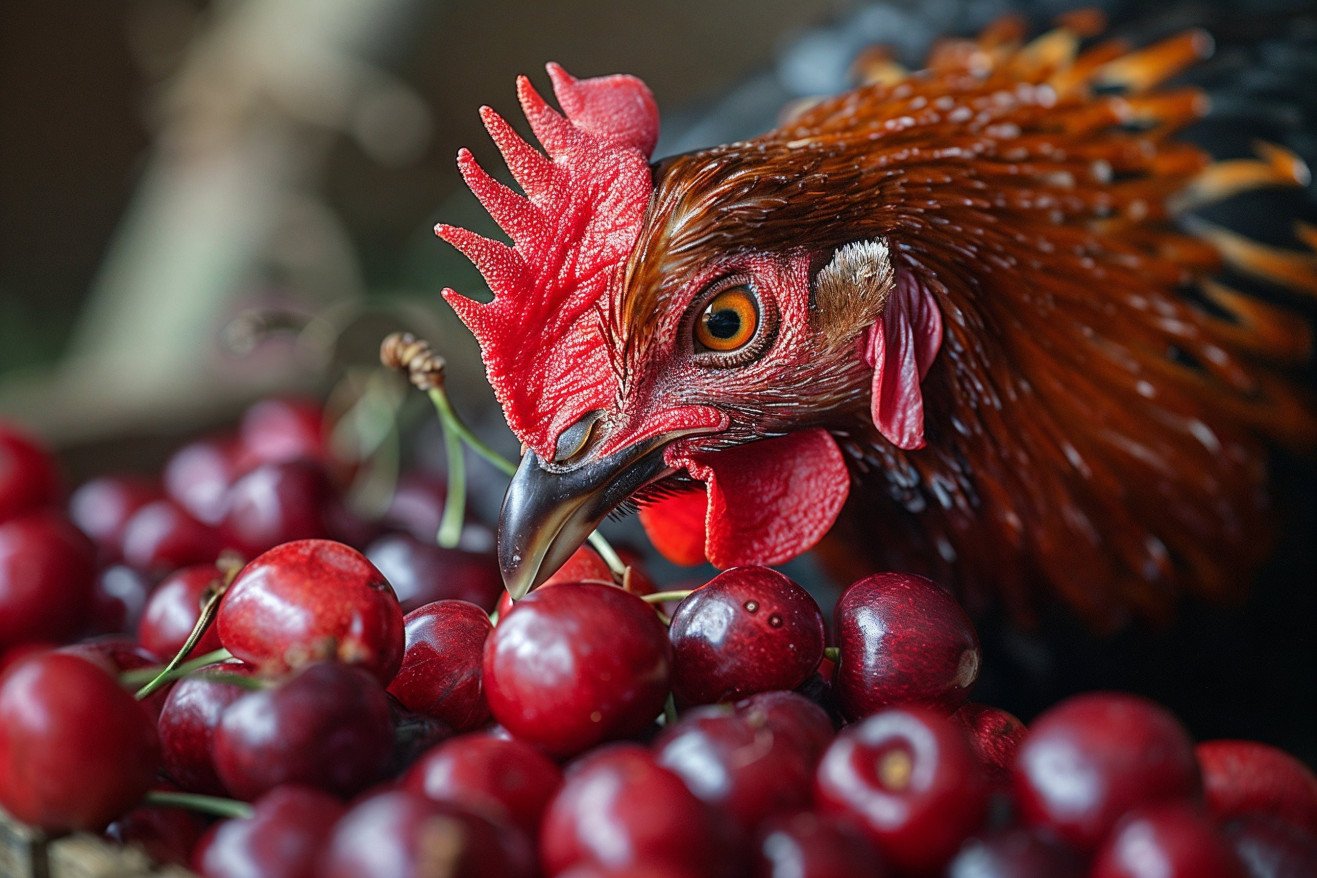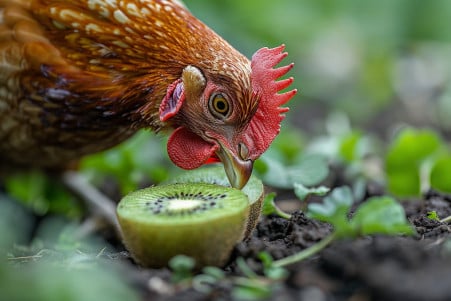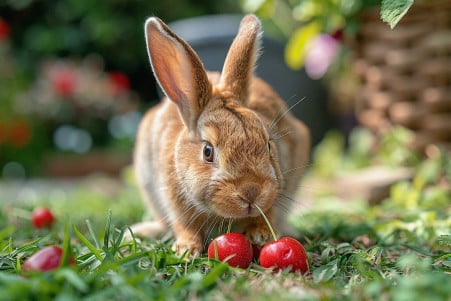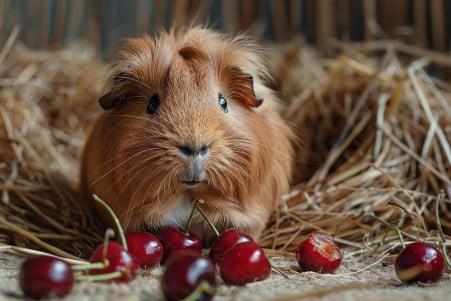Can Chickens Eat Cherries? Safe Treats for Your Poultry
17 February 2024 • Updated 16 February 2024

Cherries are one of the best parts of summer, but can your chickens enjoy them as much as you do? The answer is yes, chickens can eat cherries, but there are some things to keep in mind.
First, you need to make sure that the pits are removed so that your chickens don’t choke, and so that they don’t ingest any cyanide.
Second, you need to make sure that you feed them to your chickens in moderation since they are high in sugar. This means that you should only give them cherries every once in a while as a supplement to their regular feed.
This article will explore a wide range of agricultural and nutritional research on what chickens eat and what they need to eat. We will discuss the pros and cons of feeding cherries to chickens, as well as how to prepare them so that they are safe for your birds.
We will also discuss what vets and other poultry experts have to say about feeding chickens cherries, how chickens eat in the wild, and why it’s important to make sure that your chickens have a diverse diet.
Can chickens eat cherries?
Nutritional Value: What Cherries Bring to Chicken Feed
Cherries are a tasty treat that also bring a number of important nutrients to the table for chickens. As noted by Pet Keen, cherries are a good source of potassium, vitamin A, fiber, and vitamin C. These nutrients are important for a chicken’s overall health. For instance, vitamin A is essential for maintaining healthy eyesight, while vitamin C is important for the immune system, helping to protect chickens from common poultry diseases.
As outlined by Chickens And You, the antioxidants and phytonutrients in cherries help chickens with inflammation and digestion. They also help with bone health, which is especially important for laying hens. Feeding cherries to chickens can help ensure that they get a range of antioxidants, which help protect cells from damage and keep the flock healthy.
In terms of portion size, it’s important to feed cherries in moderation to avoid digestive issues that can come from too much sugar. Pet Keen suggests that chickens can eat one to two cherries a few times a week when stone fruits are in season.
It’s also worth noting that sweet and tart cherries have different nutritional profiles, with tart cherries generally having more antioxidants. As a result, both sweet and tart cherries can be part of a healthy chicken diet, but it’s important to feed them in a way that takes their different nutritional profiles into account.
Know the Risks: Cyanide in Cherry Pits
Cyanide is a poisonous substance found in cherry pits that can be very dangerous to chickens if they eat them. The Merck Veterinary Manual explains that cyanide inhibits mitochondrial cytochrome c oxidase, leading to hypoxia and potentially death in animals.
The lethal dose for many animals is approximately 2 mg/kg, so it’s important to make sure chickens can’t get to cherry pits. Chickens that have cyanide poisoning will show signs like rapid breathing, excitement, and bright red mucous membranes.
The chicken body metabolizes cyanide to less toxic substances like thiocyanate through enzymes like thiosulfate sulfurtransferase (TST) and 3-mercaptopyruvate sulfurtransferase (MPST), according to a 2023 article by Hansen et al. in Biologia. However, even low levels of cyanide can lead to chronic exposure that disrupts iodide uptake by the thyroid, leading to hypothyroidism and a range of neuropathies.
To make sure you can feed cherries to your chickens safely, always remove the pits and stems so that the chickens are only eating the fruit’s flesh. This will prevent them from accidentally eating pits that contain cyanide and keep your chickens safe. Knowing these risks is important for any chicken owner who wants to give cherries to their flock as a treat.
Cherry-Feeding Tips for Your Pet Birds
If you want to make sure that your birds can eat cherries safely, it’s important to start with the right preparation.
As mentioned by Pet Keen, feeding your birds one or two cherries a couple of times a week during cherry season is a great way to give them a healthy treat.
However, it’s important to make sure that you’ve removed the pits and stems to avoid the risk of choking and cyanide poisoning. Birds can eat cherries in a variety of ways, including fresh, frozen, and dried.
If you’re going to feed them frozen cherries, make sure to thaw them first to avoid any digestive issues.
For a fun way to feed your birds cherries, try making a Cherry Kebab, which is recommended by Pet Educate. Just put pitted cherries on a string and hang it in the cage. This way, your birds will get a tasty treat and a chance to engage in natural pecking and foraging behaviors.
It’s also important to make sure that you’re feeding your birds cherries in moderation. As noted by Chickens And You, it’s important to make sure that you’re keeping their diet varied. Cherries should be a supplement to their regular feed, not a replacement.
By following these tips, you can make sure that you’re feeding your birds cherries in a way that’s fun and healthy, helping them enjoy the treat without throwing off their diet.
Where Do Chickens Fall in the Pecking Order? Fruits in Poultry Nutrition
Chickens require a variety of nutrients to maintain good health and meet their production goals. According to the Alabama Cooperative Extension System, chickens require energy, protein, minerals, and vitamins to support their maintenance and growth. While chicken feed is formulated to meet all of these needs, fruits can be a good source of vitamins, antioxidants, and water when fed in moderation.
Fruits can also help increase the nutritional value of a chicken’s diet and encourage natural foraging behaviors, according to Poultry World, which discusses the use of fruit and vegetable products in poultry feeding. For example, cherries can provide vitamins A and C, potassium, and fiber in addition to the nutrients found in a chicken’s regular feed.
However, it’s important to make sure that chickens don’t get too many fruits and that they don’t get them too often to avoid digestive upset and nutritional imbalances.
According to the University of Kentucky, all of the components of a chicken’s diet, including fruits, help contribute to the overall health of the bird. A diverse diet not only helps ensure that chickens get all of the nutrients they need, but it also helps keep them mentally stimulated, which could help improve egg production and egg quality.
When it comes to cherries and other fruits in poultry diets, when used responsibly, they can clearly help improve the health of a flock.
Foraging in the Wild: Chickens and Their Natural Instincts
In the wild, chickens are natural foragers, spending much of their time scratching and pecking at the ground in search of food. This instinctual behavior is important for their survival and well-being.
In fact, the University of Kentucky notes that the ability to recognize individual chickens is important for establishing a social hierarchy, and this is largely influenced by their ability to choose and forage for food.
Meanwhile, a study in PMC found that a diverse diet not only supports chickens’ natural foraging behaviors but also determines their use of space, indicating that there is a relationship between a diverse diet and better welfare and activity levels.
Environmental enrichment, including the provision of a diverse diet, allows chickens to engage in their natural behaviors, leading to positive welfare. The RSPCA Knowledgebase explains that environmental enrichment should be based on a chicken’s natural foraging behavior to ensure that it supports good welfare.
While chickens may naturally avoid some toxic foods, providing a diet that includes safe treats, like pitted cherries, can help chickens engage in natural foraging without the risks associated with cherry pits.
By allowing chickens to engage in their natural foraging behaviors through a diverse diet that reflects the variety of their wild relatives, chicken keepers can have a big impact on their flock’s welfare.
In Conclusion: The Cherry on Top of Chicken Diets
As we have learned, cherries can be a wonderful addition to a chicken’s diet if they are fed correctly. They are packed with important vitamins and minerals like potassium, vitamin A, fiber, and vitamin C, all of which are important for a chicken’s overall health and well-being.
The antioxidants and phytonutrients in cherries can also help chickens maintain healthy eyesight, a strong immune system, and good bone health, which are all important for their health.
That said, cherries should always be fed in moderation and without the pits to avoid cyanide toxicity and choking hazards. It’s also important to make sure that cherries are a supplement to a chicken’s diet and not a replacement for the foods that they rely on for their nutritional needs.
Feeding cherries responsibly can help to diversify your chickens’ diets and encourage their natural foraging behaviors, which can improve their quality of life. It’s clear that when used responsibly, cherries can be a positive addition to your chickens’ diets and help to support their health and happiness. Let’s enjoy the benefits while remembering the precautions that will help us keep our flocks healthy.


